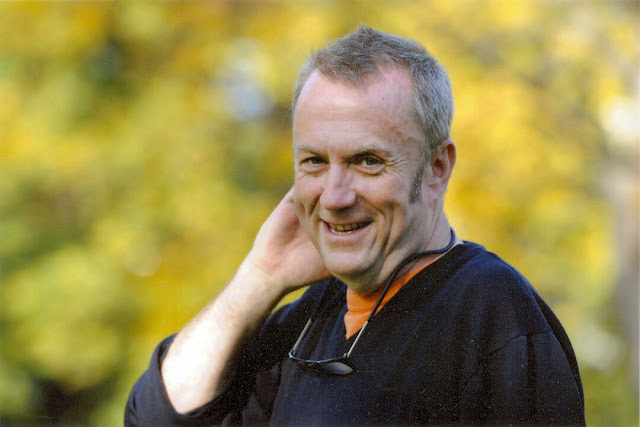English stage director Stephen Lawless was 19 years old when he started his career. He has worked all over the world on the most prestigious stages. This is his first production at Seattle Opera. Learn how Stephen got his start, what he remembers about 9/11, which titles he has not directed, and if he’s a Liverpool or Manchester soccer fan.
I can’t remember. I’ve done it a lot. The LA Opera production in 1996 was a huge boost for my career. Placido Domingo was the artistic director and Peter Hemming was the general director. They promoted the production, and it went everywhere. We did it in Geneva, Madrid, and San Diego, to name a few places.
What makes this opera more than comedy?
The tension between the main characters is very sophisticated. Nemorino and Adina are meant to be together. Everybody can see it. But they can’t get their acts together, that’s the comedic part. The serious part: their future happiness is at stake. Elixir is an absolute masterpiece and more than an opera buffa.
How has Shakespeare influenced your career?
I grew up in Warrington, England, about two hours from Stratford. [Stratford-upon-Avon is the birthplace of William Shakespeare.] My school went there every year. I saw a production of Twelfth Night with a very young actress that nobody knew named Judi Dench. It was directed by John Barton. That show was the first time I was aware that there was a person working behind the scenes manipulating what happens on stage. Then I spent quite a lot of time assisting the founder of the Royal Shakespeare Company and the National Theatre, Sir Peter Hall. I worked on his production of The Merchant of Venice in the West End that went on to Broadway and starred Dustin Hoffman. So, Shakespeare and I go way back.
 |
| The Royal Shakespeakre Theatre in Stratford-upon-Avon. Source: Wikimedia Commons. |
What excites you about the current state of opera?
During the pandemic I did quite a bit of coaching with students in the Royal Conservatoire of Scotland in Glasgow. I found working with students invigorating and regenerating. Their enthusiasm and passion and talent were an absolute privilege to witness. The young talent is what excites me.
What worries you about the current state of opera?
I suppose it is the fact that not enough new pieces are being written that stay in the repertoire for any length of time. That is what keeps me awake at night.
How did you get started directing?
In my last year of school, I knew I wanted to be an opera director, so I wrote to producer John Copley at Covent Garden. It took three months to get a reply. The people at Convent Garden sent the letter to Australia where John had been working. Then the people in Australia forwarded the letter to Hawai‘i where he was on vacation. Three months later, he invited me to meet him in London. He got me into the stage management program at the London Opera Center. But I didn’t finish the program because I got a job working for Benjamin Britten and Peter Pears. I always say, ‘It’s been downhill ever since.’
At this point of the pandemic, audiences are slowly making their way back to live performances, a situation similar to September 11, 2001. What do you remember about 9/11?
I was in New York City directing The Flying Dutchman at the New York Opera Center. The attack happened the day it was going to open. Obviously, the performance didn’t happen. It opened several nights later. The audience was half full, people were afraid to come out, which is understandable. However, it was a defining moment for me, kind of cathartic. The audience who saw it, needed to. That audience completely understood why we need live art and music in our lives. The emotion at the end of that show was absolutely extraordinary.
 |
| The City Opera company and crew on stage at the New York State Theater before their performance of The Flying Dutchman on September 15, 2001. Source: Sara Krulwich / The New York Times. |
How is that night similar or different from your recent return to live performance?
Similarly, some people are not ready to venture out yet. However, for the people that are coming to performances, they have a real thirst for culture, and they have a deep connection to art and music that makes them who they are.
What title is on your bucket list to direct?
Giuseppe Verdi’s Don Carlos. It’s my favorite opera. I’ve been offered it three times, but it hasn’t work out. I’m desperate to do it before I stop. I’ve also not done Madame Butterfly. When I bump into people I know—singers, conductors, and others—and they tell me that they are in Butterfly, and I’m envious.
Warrington, England, is located between Liverpool and Manchester, which team do you root for?
I grew up watching Rugby. My dad took me to Warrington Wolves matches. I think you risk losing your life if you say publicly which club you pick. I’ll just stick with the Wolves.
The Elixir of Love runs August 6–20, 2022 at McCaw Hall. Utterly enjoyable from first sip to last, this fizzy concoction is opera’s most winning comedy. A lovestruck bumpkin is about to lose the company of a rich and independent landowner. Crossing paths with a quack doctor, he soon gets duped in more ways than one. Wine, a windfall, and a fateful “furtive tear” eventually reveal happy truths as sincerity triumphs amid much rejoicing. Tickets and info at seattleopera.org/elixir.

1.jpg)



No comments:
Post a Comment